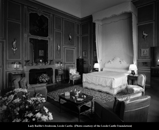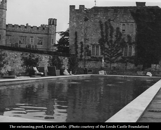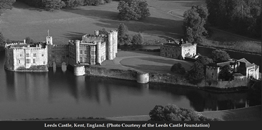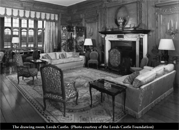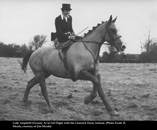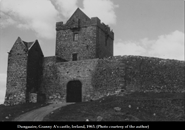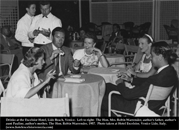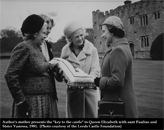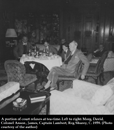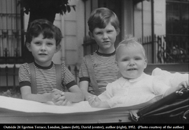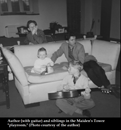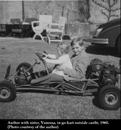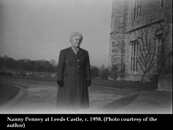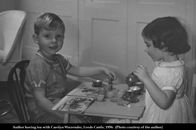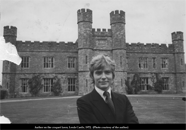
Lady Baillie (Granny B)
The castle way’s feudal system – structured, top-down authority – was straightforward, and castle life was big, regulated, and formal. Granny B, as chatelaine and keeper of the purse strings, was the undisputed leader and ruler of the roost. She was ideally suited to this position thanks to her wealth and her personality, which bypassed gregariousness in favor of quiet authority and seductive style. Her manner was rigorously polite, her gaze unfaltering, her smile infrequent, her charm carefully rationed.
Lady Ampthill (Granny A)
About Granny A I had mixed feelings. Her domineering personality could one day whisk me along on a magic carpet ride, but on another give me a drastic case of the heebie-jeebies. I seldom saw her because she was always traveling or foxhunting or both, but when she did enter my life she blew in like a hurricane, engulfing the house hold for however long she was around in a blitzkrieg of nonstop activity. Walks, games, come here, go there, do this, do that. It took everyone at least a week to recover after she left – even Nanny, who would have her job explained to her in the minutest detail, daily. Granny A was a terror but she loved us, and this was her way of expressing it. “After all, my darlings,” she would say. “You don’t get to see me that often.”
My Parents
Much to my father’s amusement and annoyance, frequently in equal proportions, my mother hoarded newspapers and magazines and was often to be seen reading the Daily Express not just from the previous day but from the previous year. As time passed, her collection grew, and cupboards started to fill up with editions of Tatler and Haper’s Bazaar from the 1940s. On the weekend drive down to the castle, suitcases and newspaper bundles fought for available space in the trunk of the Bentley R Type, a gift to my parents from Granny B. Later in life my mother frequently opted to wear eccentrically colourful ensembles and usually carried them off with style. Her dazzling, alluring forget-me-not blue eyes radiated warmth and kindness, and her personality, though given to moods, was generous and imbued with a contagious sense of fun. When discussing the American branch of the family she enjoyed referring to us as “the poor cousins,” which amused and confused me greatly. If we were poor, living between a large house in Knightsbridge, London, and a fairy-tale castle in Kent, where, exact, did that place everyone else?
My father, who met my mother when he was invited by Granny B to a Leeds Castle weekend after the war, rose to be a Captain in the Irish Guards during World War II, was then General Manager of Fortnum & Mason for four years, Chairman of the New Providence Hotel in the Bahamas, a West End theater impresario, a director of United Newspapers, Chairman of London’s Emergency Helicopter Service, and for over thirty years a distinguished member of the House of Lords, becoming Chairman of Committees in 1992.
Morg & ‘the Court’
Morg was the first guest to stay the night at the MT, which was symbolic of how much we loved him, and of his unique place within the Leeds Castle community, where his special gift of friendship was given to everyone without thought for rank, position, or circumstance. If ever the expression “light up a room” applied to anyone, it applied to him because his presence and personality were not just impressive but also generous, warm-hearted, devoid of self-reverence, and suffused with a sense of humour which crackled and popped and always hit the right notes with a ping.
The court was made up of close friends and immediate family who found it amusing to refer to themselves as though they were royal courtiers, most of them drawn from the higher ranks of society. If Granny B was amused by the unsubtle, gently mocking comparison of her domestic arrangements to the households of Queen Elizabeth and other monarchs, she hid it well. And I never saw anyone speak of “the court” to her face. Even my mother would only use the term with a wry smile attached.
Brothers & Sister
My brothers, David and James, were five and four years older than I, respectively, which meant that by the time I was old enough to start enjoying their company they were away during weekdays at Hill House, the prep-school in Hans Place, not far from Harrods, where I also would be dispatched when I was five. I therefore saw them only first thing in the morning, and for a little while in the afternoon when they got home and the nursery decibels went up several notches. Our activities were seldom interrelated, as my bath, supper and bedtimes were earlier than theirs, so I had to make the most of the snippets of time I had with them. What I gathered was that David was the mild- mannered one with the brains, and James the mischievously disruptive one with the looks.
Now that we were all on top of each other, in a manner of speaking, no longer separated by corridors, arches, and hallways or controlled by the strictest of castle way rules, there developed an almost festive atmosphere to family life at the MT, greatly enhanced by the presence of my little sister. Vanessa not only gave Nanny a whole new lease on life…
Nanny
I decided very early on that everything about Nanny was perfect. She never made me eat soap if I was naughty or permitted my uneaten spinach from the night before to resurface at breakfast time, as my mother’s ferocious nurse had reportedly done, occasionally even locking her in a cupboard until she promised to do as she’d been told. My nanny’s name was Irene Penney. I never met her parents or her sister, who lived in Birmingham. Though never fat, Nanny was a little dumpy, which to my mind perfectly offset her kind and comely face with its square jaw, straight mouth, and handsome nose. She had small blue eyes, topped off by daintily arched eyebrows and a full shock of white hair swept back off her high forehead. Her presence was utterly reassuring, her manner always calm, and she was a fount of vital information about all things, important and otherwise.
Me & the Warrender girls
The three of us loved being together, and indeed plans had already been laid for us to get married, with only one small detail to be worked out: Was I to marry Carolyn or Annabel? On the walks back to our respective B and Bs, marital discussions would resume exactly where they had left off .
“I’m older and therefore I should get to choose, and I think I will marry Anthony,” Carolyn told Annabel, her mellifluous voice firm, her sharp features focused.
“But I’ll be so unhappy, and you mustn’t make me unhappy!”Annabel responded, and I agreed that this was a very important point.
“Look,” I proposed. “Can I marry Carolyn first, then you after?”
“But how long will I have to wait?” Annabel asked. “It’s not at all fair.”
“I could marry you first,” I said undiplomatically.
“No, you won’t. You’ll marry me first. Please don’t be silly.” Carolyn put her foot down forcefully, which left me wondering if we’d ever resolve this intractable problem.
Author
Growing up with Leeds Castle as my second home, the other being my parents well-staffed five-story house on Egerton Terrace, in Knightsbridge, London, had the less than desirable effect of effortlessly rendering me more spoiled than a Buckingham Palace corgi before I understood the meaning of the word.



